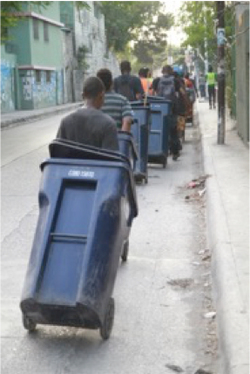Pwojè Netwayaj
Transforming waste management in Port-au-Prince by empowering communities
Statement of Need
The majority of the Haitian population in Port-au-Prince lives in dense neighborhoods with little or no garbage removal. In a country facing a constant threat from hurricanes and floods, the millions of people living in these vulnerable areas are at heightened risk of infectious diseases and physical injury because of the waste.
The Haitian government division of waste management SMCRS (Service Metropolitain de Collecte de Residus Solides) is unable to provide routine trash collection services to the residents of Port-au-Prince due to the high-costs of truck maintenance and lack of staff and resources. There is no reliable system or schedule for the drivers and neighborhoods aren’t aware or prepared to bring their trash to the street when the truck passes by. Heaping piles of garbage accumulate on the streets because there are no public street garbage bins. Haitian society has adapted and acculturated to overflowing garbage.
Introduction
Port-au-Prince, Haiti faces a garbage crisis. Much like in other countries throughout the developing world, there are large amounts of garbage and waste in the streets because of the lack of consistent public trash removal services. The garbage poses health and safety risks, stifles economic vitality, and deflates community pride and strength.


Konbit Mizik, a 501(c)3 non-profit organization in Haiti, in partnership with Haitian government, emerging local waste management entrepreneurs, grassroots groups, and an assortment of Haiti’s biggest music stars, is proud to present Pwojè Netwayaj (tr. Clean-Up Project) - a unique and innovative solution to transform waste management in Port-au-Prince by organizing and mobilizing young people to take ownership for their communities’ health and resilience.
Objectives & Metrics
Since July 2015, Konbit Mizik has successfully organized and executed on-time and on-budget implementations of community-driven trash removal. We measure our success in the following ways:
Objective 1 – Systems building
-
The staff and volunteers of Konbit Mizik have developed financial and activity reporting mechanisms to track expenditures, successes and challenges for each implementation
Objective 2 – Community Participation and Empowerment
-
Word of mouth and referrals have resulted in a roster of over 50 young men and women eager to participate, with exponential growth potential
Objective 3 – Garbage Removal and Street-Cleaning
-
300 bins of waste collected and removed
-
2 miles of streets cleaned
There are multiple objectives and layers of benefit to this program:
-
Community participation and empowerment – Pwojè Netwayaj is a community service project conceived, designed, and implemented by Haitians for Haitians. Haitians are very proud of their country and want to make it beautiful again. Pwojè Netwayaj provides the structure and systems to turn their vision into a reality.
-
Improvement of Population Health – In addition to physically removing harmful waste, Pwojè Netwayaj presents an opportunity to provide education to community members regarding the importance of hand washing, the prevalence of communicable diseases, and the heightened health risks during natural disasters.
-
Economic Revitalization – Pwojè Netwayaj contributes to the Haitian economy by a) directly paying per diem wages to scores of workers, and b) making tangible strides toward rebranding Haiti both domestically and internationally. This is an important piece of the blueprint to attract foreign investors and tourists, and incentivize skilled and educated Haitians not to emigrate.
-
Disaster Risk Reduction – Flooding and polluted water increase the risk of communicable diseases, chemical hazards, and injury. Pwojè Netwayaj is a grassroots, scalable project to rid the streets of harmful waste and provide vital health education the residents living in Port-au-Prince.
Coalition Partners
1. Service Metropolitain de Collecte de Residus Solides – (SMCRS) The Haitian government division of waste management under the Ministry of the Interior
2. Haiti Clean System – a locally organized private enterprise which provides trash collection services to residents in Port-au-Prince.
3. Centre d’Étude et de Coopération Internationale – CECI is a leader within an international network of partners combating poverty and exclusion, building development capacity, and works closely with humanitarian organizations specializing in disaster relief. (www.ceci.ca)
4. Ministère de la Santé Publique et de la Population – The Ministry of Public Health and Population is the arm of the Executive responsible for formulating and executing the National Public Health Policy. (http://mspp.gouv.ht/)

 |  |  |
|---|---|---|
 |  |  |
 |  |  |
 |  |
